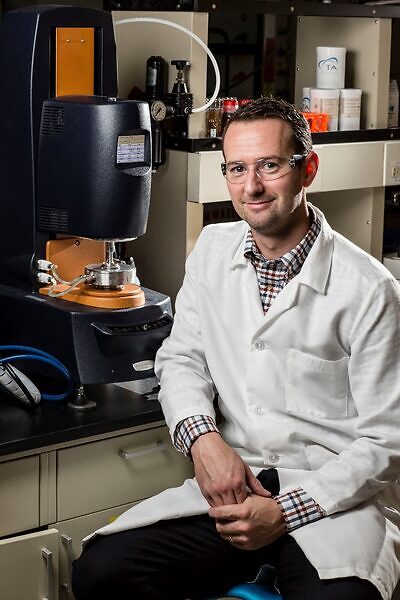Virtual Seminar"A material’s perspective: Developing a transient framework for understanding nonlinear rheological responses"Simon Rogers

Date
Location
Description
Micro/Bio/Nanofluidics (Shen) Unit would like to invite you to the virtual seminar by Prof. Simon Rogers on April 19 (Monday).
----------------------------------------------------------------------
Date: Monday, April 19, 2021
Time: 9:00-10:00AM
**Zoom session
----------------------------------------------------------------------
*Zoom information
Join Zoom Meeting
https://oist.zoom.us/j/96945297161?pwd=OHNtdkJrVE44eFZkSG8ybjlEdCs2QT09
Meeting ID: 969 4529 7161
Passcode: 742021
Speaker:
Simon Rogers
Assistant Professor
Chemical and Biomolecular Engineering
University of Illinois at Urbana-Champaign
Title:
A material’s perspective: Developing a transient framework for understanding nonlinear rheological responses
Abstract:
Modern society relies on soft materials, which are important for foods, consumer products, biological materials, and energy and environmental applications. The interactions that hold soft materials together are often comparable in magnitude to the thermal energy, making them especially susceptible to weak forces. In order to develop functional soft materials, they need to be processed far from equilibrium. Despite recent progress, we still do not understand how molecular-scale behavior informs macroscopic properties in these systems. Of particular interest is the transient nonlinear rheology, where stresses and deformations can induce massive molecular reorganizations that manifest as transformations in the macroscopic material properties. Transient conditions are encountered in most biological situations, and well as industrial flows including startup and cessation, which often dictate the success of a product or process.
One particularly interesting class of materials undergoes changes that transform their physical behavior from that of solids to that of liquids. These so-called yield stress fluids have been studied for over a hundred years, and still present significant scientific and engineering challenges. Yield stress fluids have a wide variety of microstructures, including filled polymer systems, colloidal glasses, and jammed microgels, and yet present a consistent rheology. Phenomena such as the overshoot in the loss modulus in a strain amplitude sweep, viscosity bifurcation and avalanches under stress-controlled tests, and the presence of apparent yield strains are all typical features of yield stress fluid rheology.
In this talk, I will present a rheological framework for understanding yield stress fluid rheology that is commensurate with recent rheo-SANS studies of self-assembled soft systems. The new approach describes responses in terms of instantaneous recoverable and unrecoverable strains that can be determined by iteratively performing constrained recovery steps during traditional rheological characterizations. I will show how the results of these new experiments elucidate the physics underlying yield stress fluid phenomena, and also provide insight into the phenomenon of mechanical memory observed in colloidal glasses, emulsions, and foams. The lessons learned from these experimental results have led to the development of a simple rheological model that accurately predicts yield stress fluid behavior across a wide range of situations. The new model does not contain features that have been considered crucial to understanding yield stress fluids, and yet does a better job of describing real behaviors than current state-of-the-art models. Taken together, these studies are providing a rational route toward understanding and designing structure-property-processing relationships for yield stress fluids.
Biography:
Simon A. Rogers is an Assistant Professor in the Department of Chemical and Biomolecular Engineering at the University of Illinois at Urbana-Champaign. Dr. Rogers uses experimental and computational tools to understand and model advanced colloidal, polymeric, and self-assembled materials. He joined the department in 2015. He received his BSc in 2001, BSc (Hons) in 2002; and his PhD from Victoria University of Wellington in New Zealand in 2011. He completed his postdoctoral research at the Foundation for Research and Technology in Crete, the Jülich Research Center in Germany, and the Center for Neutron Research at the University of Delaware.
Host:
Prof. Amy Shen
Subscribe to the OIST Calendar: Right-click to download, then open in your calendar application.



